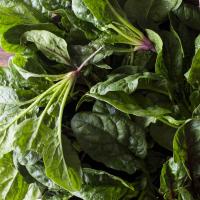
The consumption of organic products in Europe is on the rise. A popular vegetable that cannot meet that demand is organic spinach. This is mainly due to the difficult weed control in this fragile leafy vegetable sown with close row spacing, and the strict quality requirements of the cultivated product. The cut product cannot contain weeds as they affect the taste, odour, toxicity and stringiness of the end product. It is therefore quite a challenge to grow spinach without excessive manual labour, especially in organic farming.
Researchers at the Faculty of Bioscience Engineering (UGent) found more efficient methods that guarantee better chances of success for organic spinach. For example, the density and inter-row distance between the plants is of crucial importance. "Growers need a system without much manual labour, which can guarantee maximum harvest security. This can also limit the chance of rejection by the industry because of a too high proportion of weeds," says master's student Michaël Devos. Starting from this need, he went in search of ways to optimize cultivation for his thesis.
Multiple experiments showed that crop optimization is possible. The most important of these are increasing the growing density and a closer inter-row distance. The researchers found out that with increasing growing density, the weed biomass and weed fraction decreased significantly in 2 of the 3 tested varieties and the spinach biomass increased significantly.
A narrow inter-row distance combined with post-emergence weeding, a mechanical method of weed control, also resulted in less weeds. These adjustments, combined with a burning as false seedbed cultivation, or pre-emergence fires, offer the greatest added value in ensuring cultivation.
The results of this study demonstrate the importance of further research into physical weed control in fast-growing crops. This work also contributes to the achievement of the European Green Deal, in which the Commission promotes the development of organic farming with the goal of organic farming on 25% of all agricultural land by 2030.
With his thesis, Michaël took second place for the Thesis Prize for organic and agro-ecological agriculture and food 2020, awarded by the Network Research Organic Agriculture & Food (NOBL).
Source: FreshPlaza



